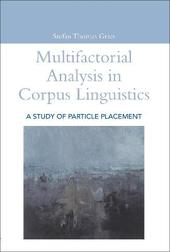
|
Multifactorial Analysis in Corpus Linguistics
Paperback / softback
Main Details
| Title |
Multifactorial Analysis in Corpus Linguistics
|
| Authors and Contributors |
By (author) Stefan Thomas Gries
|
| Series | Open Linguistics |
|---|
| Physical Properties |
| Format:Paperback / softback | | Pages:240 | | Dimensions(mm): Height 234,Width 156 |
|
| ISBN/Barcode |
9780826476067
|
| Classifications | Dewey:410.285 |
|---|
| Audience | | Professional & Vocational | |
|---|
|
Publishing Details |
| Publisher |
Bloomsbury Publishing PLC
|
| Imprint |
Continuum International Publishing Group Ltd.
|
| Publication Date |
1 February 2005 |
| Publication Country |
United Kingdom
|
Description
This book presents a novel analysis of the word-order alternation of English transitive phrasal verbs (Particle Movement) from a cognitive-functional and psycholinguistic perspective. Its main objective, however, is a methodological one, namely, to demonstrate the superiority of corpus-based, multifactorial and probabilistic approaches to grammatical phenomena over traditional analyses based on acceptability judgements and minimal pair tests. The advantages resulting from the advocated multifactorial approach to Particle Movement are: Particle Movement can be described at a previously unknown level of detail; all determinants ever proposed to govern the alternation can be integrated into a single hypothesis explaining the alternation; constructions can be compared to each other with respect to their degree of prototypicality and similarity; it is possible to actually predict with a high degree of accuracy which of the two word orders native speakers will subconsciously choose in the natural production of speech and text (thereby passing the most rigorous test conceivable); finally, competing hypotheses can be compared in terms of their predictive power. Apart from these methodological points, the study also addresses the more theoretical and linguistic question of how to explain such results. It is argued that theories of language production that rest on the notion of processing effort are, contrary to some contemporary analysts, not ideally suited to explain such phenomena and that interactive activation models of language production allow for a more elegant interpretation and implementation of the results.
Author Biography
Stefan Thomas Gries teaches in the Dept of Linguistics at the University of California, Santa Barbara.
|